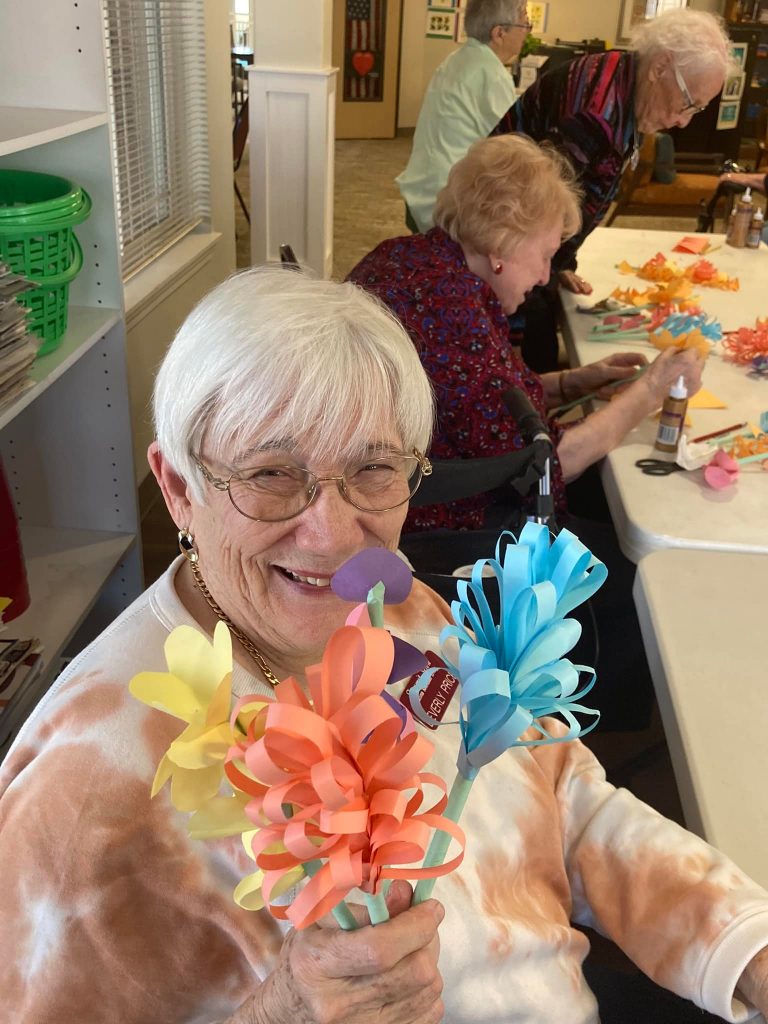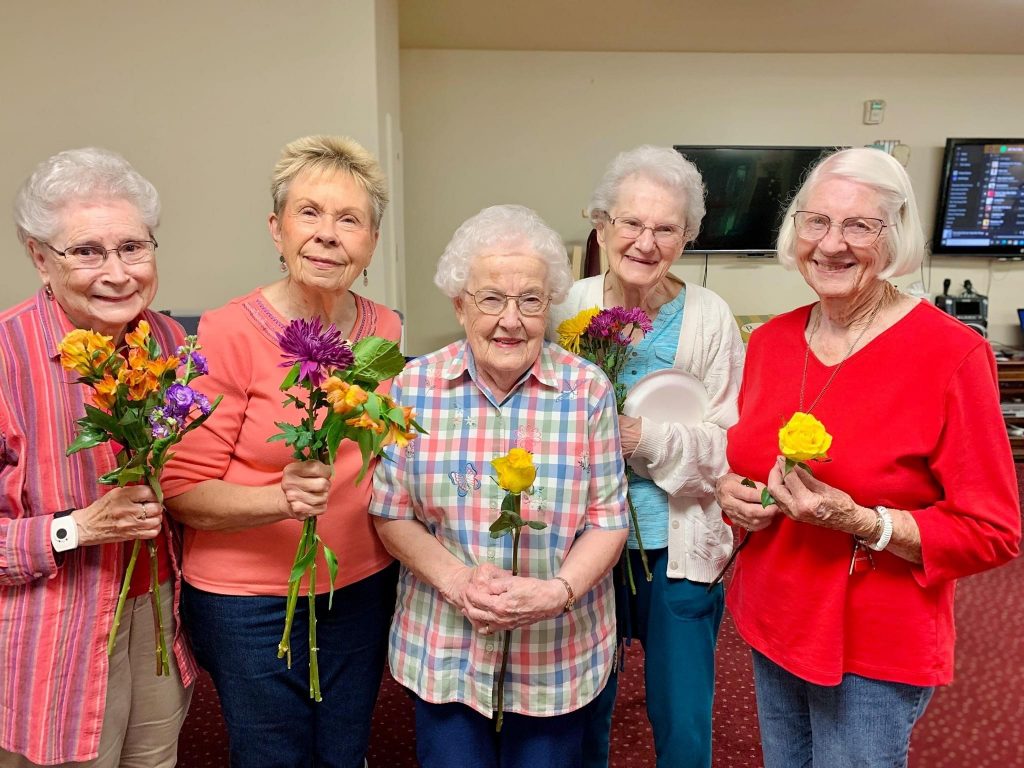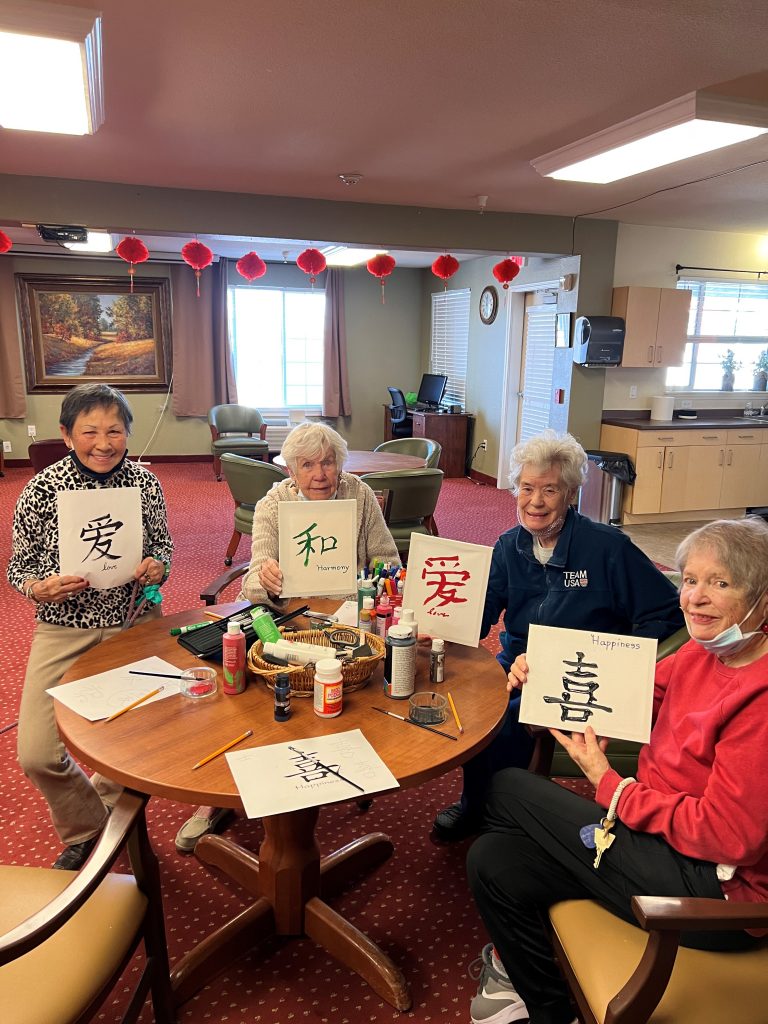How Creativity Benefits Mind, Body and Soul in Seniors
Summit Glen
Oct 24, 2022
Colorado - Colorado Springs
Email US
Click to Email UsAs children, we are encouraged to be creative – to play instruments, craft, paint and dance. But as the pressures of adult life begin to pile up, many find themselves gradually letting go of their creative side. Once in retirement, seniors have ample free time and an opportunity to rediscover their artistic nature, reaping the benefits of exploring their natural talents.
Ongoing research suggests that creativity may be key to healthy aging. Studies have shown that participating in activities such as singing, theater performance and artistry can support the well-being of older adults, and that creativity can lead to greater longevity.
At Hawthorn Senior Living, our teams are always dreaming up ways to inspire creativity, engage minds within our communities and provide unique activities for seniors.
Every day offers a variety of activities and events to choose from that promote physical activity, lifelong learning, social connection and overall wellness. Our intellectual and cultural activities like art projects, writing classes and discussion groups offer stimulating socialization and help residents get in touch with their creative side.
Benefits of Creative Activities for Seniors
Creative activities have been shown to have a positive effect on both physical and mental health. Research has found that creative expression gives seniors a sense of purpose, maintains their coordination and concentration, and improves their mental health. And for those seniors with dementia, Parkinson’s disease and other chronic degenerative diseases, participating in creative activities can reduce anxiety and depression.
Living a creative life can help older adults in multiple ways, including being part of the six aspects of successful aging that researchers have identified:
- Having a sense of purpose
- Interacting with others
- Personal growth
- Self-acceptance
- Being independent and retaining autonomy
- Overall health
Activities at Hawthorn communities incorporate all six aspects of successful aging through creative and other types of pursuits. Residents are provided a well-rounded and robust wellness plan to ensure an engaging and fulfilled retirement.
Creative Expression at Hawthorn Senior Living Communities
At all 79 Hawthorn Senior Living communities, residents can explore the diverse activities calendars, which change monthly and are curated based on resident feedback. Examples of activities include painting, sketching, photography, clay modeling, mosaics, ceramics, jewelry making, knitting, crocheting, quilting, flower arranging, wreath making and scrapbooking, just to name a few. These activities are also used in several outreach projects at Hawthorn—making wreaths for local firefighters, decorating and filling Christmas boxes for children in need around the world, and hand-sewing masks for community residents and team members.
While some programs are available at all Hawthorn communities, others may currently be available at only those locations where residents have expressed interest. The Hawthorn Senior Living teams survey residents as well as organize resident-led committees to inspire and drive the activity choices we offer.

For example, at Summit Glen in Colorado Springs, Colorado, residents have been busy making jewelry, stained glass art and their very own paper spring flower bouquets. This month’s activity calendar gives residents the opportunity to plant spring flowers, join the community choir and make cards.

Residents at Olympus Ranch in Murray, Utah, have been learning about Chinese culture and painted Chinese calligraphy on canvas – a perfect example of combining mind-stimulating activities and creative arts. This month, residents can bake challah with the head chef, create personalized fragrances, and write and share their own poetry.

Get Creative at a Hawthorn Senior Living Near You
Creative activities help us discover new strengths because of our age, not despite it. They bring a sense of meaning, purpose and joy to our lives. And Hawthorn Senior Living communities provide an unmatched array of creative activities for seniors. In fact, creativity and lifelong learning are woven into the tapestry of Hawthorn life.
Other Articles You May Like
Understanding ADLs and IADLs: Keys to Pennsylvanias Medicaid HCBS Programs
Pennsylvania offers Medicaid waiver programs under the Community HealthChoices (CHC) umbrella and the Pennsylvania Department of Aging (PDA) Waiver (often referred to as the PA Council on Aging Waiver). These programs help older adults and individuals with physical disabilities remain in their homes or community settings instead of entering nursing facilities. CHC and the PDA Waiver provide long-term services and supports (LTSS) based on assessed functional needs, emphasizing assistance with ADLs and IADLs. Covered services may include personal care assistance, adult day services, home-delivered meals, transportation, home modifications, assistive technology, and respite care for family caregivers. In addition, Pennsylvanias CHC Waiver offers Participant-Directed Services that allow participants to hire and manage their own caregivers, including family members. To qualify, applicants must be Medicaid-eligible, at least 60 years old (for PDA Waiver) or 21+ (for CHC), and require a nursing facility level of care as determined through a standardized functional assessment of ADLs/IADLs. In this article, we explain what Activities of Daily Living (ADLs) and Instrumental Activities of Daily Living (IADLs) are and how needing help with these tasks is central to qualifying for Pennsylvanias Medicaid waivers like CHC and the PDA Waiver.What Are ADLs (Activities of Daily Living)?Activities of Daily Living (ADLs) are fundamental self-care tasks that a person must perform daily to maintain independence. Difficulty with ADLs often signals a need for supportive services. Core ADLs include: Mobility (Ambulating/Transferring): Safely walking, getting up from a chair, or transferring from a bed to a wheelchair. Dressing: Selecting and putting on appropriate clothing (including handling fasteners) without assistance. Eating: Feeding oneselfusing utensils to get food from a plate to the mouth and consuming it. Personal Hygiene: Bathing or showering and performing grooming activities like shaving, brushing teeth, and combing hair on ones own. Toileting (Continence): Independently using the toiletgetting to the toilet, transferring on and off, and cleaning oneself afterward. When someone can no longer perform several ADLs without help, it indicates that ongoing care or support is likely needed.What Are IADLs (Instrumental Activities of Daily Living)?Instrumental Activities of Daily Living (IADLs) are more complex tasks that allow a person to live independently in the community. While not necessarily performed daily, they are essential for managing ones household and life. Key IADLs include: Shopping for Essentials: The ability to shop for groceries, pick up prescriptions, or purchase clothing and other necessities. Meal Preparation: Planning and cooking mealsgathering ingredients and safely using kitchen appliances. Housekeeping: Keeping the home clean and livable tasks like cleaning, laundry, and taking out the trash. Money Management: Handling finances, such as paying bills on time, managing bank accounts, and budgeting. Transportation: Getting around or arranging transportationdriving oneself or using public transit or rides to run errands and attend appointments. Medication Management: Managing and taking medications properly remembering to take the correct medicines at scheduled times and refilling prescriptions. Communication: Using the phone or computer to communicatelooking up phone numbers, making calls, sending emails, and staying in touch with others. Trouble with IADLs is often one of the first signs that someone needs more support, even if basic ADLs are unaffected.Why ADLs and IADLs Matter for Medicaid Waiver EligibilityIn Pennsylvania, needing help with ADLs and IADLs is a central eligibility criterion for the CHC and PDA Waiver programs. These waivers serve individuals who would otherwise qualify for nursing facility care but prefer to remain in their own homes or community settings. Eligibility is determined through both financial and functional assessments. The functional assessment evaluates whether an individual requires hands-on assistance with ADLs and/or significant help with IADLs, thereby meeting a nursing facility level of care. Pennsylvania uses standardized toolsoften the Pennsylvania LongTerm Care Assessment System (PaLTAS) or the Minimum Data SetHome Care (MDSHC)to score independence in ADLs and IADLs.During the functional evaluation, an assessor reviews abilities such as transferring from bed to chair, walking safely, eating, toileting, meal preparation, housekeeping, medication management, and managing money. Cognitive issuessuch as memory problems due to dementiaare also considered since they impact daily functioning. If an individual cannot perform multiple ADLs without assistance or has significant deficits in IADLs, they are likely to meet the level-of-care requirement and become eligible for waiver services.Community HealthChoices (CHC) WaiverCommunity HealthChoices (CHC) is Pennsylvanias comprehensive HCBS waiver program for individuals aged 21 and older who require a nursing facility level of care. Administered by the Office of Long-Term Living (OLTL), CHC is a managed care program that combines physical health, long-term services and supports, and pharmacy benefits under a single plan (with behavioral health carved out). To qualify for CHC: Be age 21 or older. Meet Medicaid financial eligibility guidelines. Require a nursing facility level of care (confirmed through functional assessment). Live in a setting that meets HCBS requirements (e.g., home, apartment, assisted living). Be a Pennsylvania resident. Once enrolled, participants receive a comprehensive package of services tailored to their needs. Covered services may include personal assistance, home-delivered meals, adult day services, behavioral support, professional nursing, home modifications, assistive technology, transportation, and respite care. CHC also offers Participant-Directed Services, allowing participants to recruit, hire, train, and supervise their own caregiversoften family membersto assist with ADLs (bathing, dressing, toileting) and IADLs (meal preparation, medication reminders).PDA Waiver (Council on Aging Waiver)The Pennsylvania Department of Aging (PDA) Waiver, also called the Council on Aging Waiver, serves seniors aged 60 and over who require nursing facility level of care but choose to remain at home or in other community-based settings like domiciliary care homes. To qualify: Be age 60 or older. Meet Medicaid financial eligibility requirements. Be assessed as requiring nursing facility level of care (through the functional assessment). Live in a qualifying community setting. Covered services under the PDA Waiver may include personal care assistance, home-delivered meals, homemaker services, personal emergency response systems, respite care, adult day services, minor home modifications, and transportation. Like CHC, the PDA Waiver emphasizes managing ADL and IADL needs to keep participants safely in their homes.Participant-Directed ServicesBoth CHC and the PDA Waiver offer Participant-Directed Services, which empower participants to choose and manage their own caregivers, including family members, friends, or neighbors. Under this model, participants develop a service plan with guidance from a care coordinator, set schedules, and handle payroll tasks. This flexibility helps ensure that personal care and IADL support align with participants preferences and routines.Signs That Your Loved One May QualifyBelow are practical indicators that someone may be eligible for Pennsylvanias CHC or PDA Waiver due to difficulty with ADLs and IADLs: Trouble with Personal Care: Skipping showers, unkempt hair, or wearing dirty clothes may indicate difficulties with bathing and dressing (ADLs). Malnutrition or Weight Loss: An empty fridge or significant weight loss suggests issues with meal prep or feeding oneself (ADLs/IADLs). Mobility Decline and Falls: Struggling to walk without assistance, needing help to stand, or experiencing frequent falls signals reduced mobility (ADL: transferring/ambulating). Medication Errors and Memory Problems: Missing doses, mixing up pills, or forgetting appointments point to challenges with medication management and scheduling (IADLs). Household Neglect: Piles of mail, unpaid bills, or a cluttered home reflect trouble with housekeeping and money management (IADLs). A combination of needing help with several ADLslike bathing and toiletingand difficulties with IADLssuch as meal prep and housekeepingstrongly indicates a nursing facility level of care. Document these challenges for the functional assessment to demonstrate eligibility.Were Here to Help: Next Steps and Contact InformationNavigating Pennsylvanias Medicaid waiver programs can be complex, but you dont have to go it alone. At Passion to Care, we specialize in guiding Pennsylvania families through the CHC and PDA Waiver application processesfrom the initial functional assessment of ADLs and IADLs to completing paperwork and coordinating services once approved. If you notice your loved one struggling with daily tasks or if a professional has recommended nursing facility care, it may be time to explore CHC or the PDA Waiver. Our compassionate, family-first team ensures your loved ones needs are met with dignity and respect. Call us or contact us today to learn how to get started with Pennsylvanias Medicaid waivers for home and community-based services.
Mastering your health after 50
As you get older, health screenings and checkups become a more vital part of your overall well-being. Knowing which screenings to get after 50, and how often, will support early detection and effective treatment, while also helping you stay proactive about your health. To make being proactive even easier, weve created a handy preventive care guide filled with quick health tips and the information you need to stay on top of your health screenings. Click below to download your free health screening guide today -https://transformingage.org/mastering-your-health-after-50/- Call us today to learn more 720-505-5133.
Local Services By This Author
Summit Glen
Independent Living 4825 Old Farm Drive, Colorado Springs, Colorado, 80917Summit Glen features an active lifestyle, with a full complement of amenities and services so you can enjoy your retirement and spend more time with new friends and family. Our independent lifestyle includes a live-in management team that is available 24/7 in case of an emergency. Each private apartment includes emergency pull cords that link you to our management team 24 hours a day. Monthly rent includes three chef-prepared meals daily, transportation, exciting events and activities, and weekly housekeeping and if you need additional help such as medication reminders, you can contract with our in-home healthcare provider.

